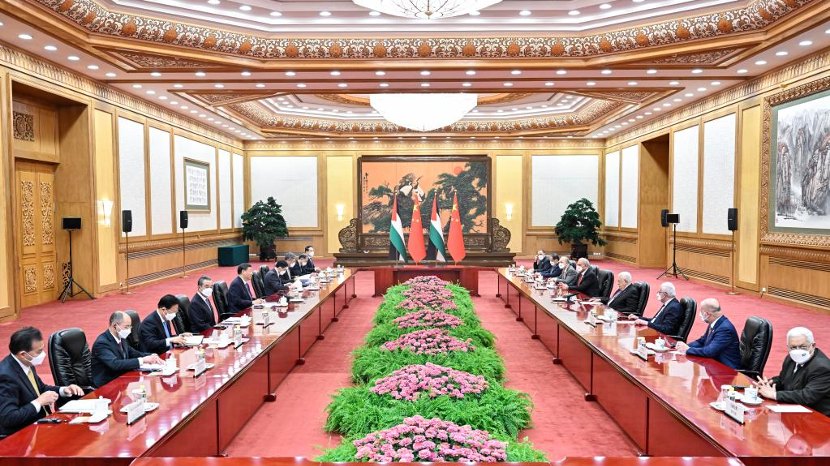
Chinese President Xi Jinping holds a welcoming ceremony for Palestinian President Mahmoud Abbas in the Northern Hall of the Great Hall of the People before their talks in Beijing, China, June 14, 2023. [Photo/Xinhua]
By Muhammad Asif Noor
The recent visit of Palestinian President Mahmoud Abbas to China reflects the shifting dynamics in the Middle East and China's increasing involvement in mediating regional conflicts. China's successful efforts in brokering the resumption of diplomatic relations between Saudi Arabia and Iran have gathered recognition and have paved the way for its growing influence as a mediator in the region. As China continues to develop friendly ties with Middle Eastern nations, its engagement, and potential to promote peace are gaining attention.
The visit of Special Envoy of the UN Secretary-General for Yemen Hans Grundberg to Beijing also highlights China's position as a global power and its potential to leverage its influence in supporting peace efforts. Grundberg's acknowledgment of China's role in Yemen's peace process emphasizes the need for international cooperation and recognizes China as a valuable partner in resolving conflicts.
The establishment of a strategic partnership between China and Palestine, as announced during the talks between Chinese President Xi Jinping and Palestinian President Mahmoud Abbas, further underscores China's active role in seeking a peaceful resolution to the Palestinian question. China's involvement in the Middle East, particularly in the Israel-Palestine conflict, has become more sophisticated and pragmatic.
Xi's three-point peace proposal during his meeting with Abbas emphasizes the establishment of an independent state of Palestine with full sovereignty based on the 1967 borders, economic development, and humanitarian aid for Palestine, and the importance of respecting the historical status quo of holy sites in Jerusalem. This streamlined proposal reflects China's neutral stance and pragmatic approach to finding a lasting solution.
China's enduring and profound relationship with Palestine spans several decades, originating from the establishment of a Palestine Liberation Organization (PLO) office in Beijing in 1965 and solidifying into a formal diplomatic relationship in 1988, underscores its historical engagement in the region. The signing of a free trade agreement Memorandum of Understanding in 2018 and the subsequent growth in bilateral trade volume further demonstrate China's commitment to enhancing economic cooperation with Palestine. This multi-faceted engagement showcases China's long-term dedication to the Palestinian cause and its efforts to promote mutual prosperity.
China's diplomatic efforts in the Middle East align with the Belt and Road Initiative (BRI), which aims to foster economic cooperation and connectivity among nations. The potential for cooperation between China and Palestine under the BRI framework holds promise for addressing the economic challenges faced by Palestine. Chinese investment and technology cooperation has the potential to boost infrastructure development and address long-standing issues resulting from the Israeli-Palestinian conflict.

Chinese President Xi Jinping holds talks with Palestinian President Mahmoud Abbas at the Great Hall of the People in Beijing, China, June 14, 2023. [Photo/Xinhua]
China's mediation in facilitating the resumption of diplomatic relations between Saudi Arabia and Iran has been widely recognized as historic and surprising. This initiative demonstrates China's growing diplomatic influence and its willingness to leverage its position to reduce tensions and promote dialogue between regional rivals. The reconciliation between Saudi Arabia and Iran is crucial for fostering unity within Palestine and has the potential to contribute to a more stable Middle East.
China's pursuit of peace in the Middle East draws inspiration from ancient Chinese wisdom, as reflected in its adherence to principles such as avoiding bullying and advocating for harmony. China's approach prioritizes diplomacy and multilateralism, recognizing that force, intimidation, or domination are not sustainable solutions to complex conflicts rooted in religious, historical, and geopolitical factors. China's efforts align with its broader vision of global security governance, promoting durable peace and development for the benefit of all.
While the United States has been involved in the region for decades, the lack of substantial progress in resolving conflicts necessitates alternative approaches. China's rising involvement as a mediator in the Middle East offers a fresh perspective and an opportunity for new initiatives. With its pragmatic peace roadmap and economic cooperation potential, China can contribute to finding a comprehensive solution to the Israel-Palestine conflict and promote stability in the region.
While some may speculate about the great power rivalry between China and the United States in the Middle East, it is important to recognize that China's actions are driven by a desire for cooperation rather than confrontation. China does not seek to dominate the world but aims to contribute to a more harmonious and interdependent world. China's approach is guided by the principles of mutual respect, diversity, and non-interference, seeking to create an inclusive and stable international order.
China's commitment to promoting peace in the Middle East is a welcome contribution to a world marked by complex challenges and interdependence. By leveraging its diplomatic influence, historical ties, and pragmatic approach, China has the potential to play a constructive role in resolving conflicts and fostering regional cooperation. The international community should recognize and support China's efforts, as collective action and dialogue are crucial for achieving lasting peace in the Middle East and beyond.
Muhammad Asif Noor, a special commentator on current affairs for CGTN, is the founder of the Friends of BRI Forum, a Pakistan-based think tank.

 中文
中文



